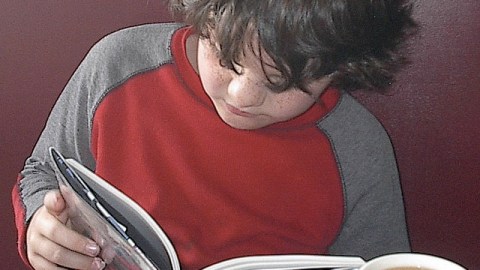If “We Can’t Teach Students to Love Reading,” What Can We Teach?

Is it true that deep, sustained reading is an experience only a small minority of people “naturally” enjoy? And if so, does it follow that since “some current college students will not have had [that experience]…it would be futile and painful to expect them to read as most of their teachers have read”?
That’s the gauntlet gingerly thrown down by Alan Jacobs’ recent Chronicle Review article, “We Can’t Teach Students to Love Reading.” Thoughtful and well-meaning as the piece is, I take issue with the claim above, as well as with Jacobs’ broader argument that “much of the anxiety about American reading habits…arises from frustration at not being able to sustain a permanent expansion of ‘the reading class’ beyond what may be its natural limits.” Of course, as a teacher at the very beginning of his career, I’m aware of the risk of sounding naïve here—years from now I might be staring hollow-eyed into a beer mug, whispering “Jacobs was right.” For now, though, I’d like to offer a humble rebuttal.
First, is Jacobs referring to the same generation of college students that has made the Harry Potter series among the bestselling books in history? Never mind whether you’re a Potter fan or not; just consider the fact that a bunch of novels—many of them tomes as thick as your forearm—have become cultural icons for this group in a way that no TV show or movie has. (Well, with the possible exception of the Harry Potter films. Or the Twilight films, also based on bestselling books.) Even if you buy Harold Bloom’s claim that these books foster poor taste in literature, you have to admit that this is not a generation incapable of sustained focus, or allergic to the act of turning pages. From a teaching standpoint, I see plenty to build on there.
Second, one of Jacobs’ key pieces of evidence works directly against his thesis:
…The idea that many teachers hold today, that one of the purposes of education is to teach students to love reading—or at least to appreciate and enjoy whole books—is largely alien to the history of education. And perhaps alien to the history of reading as well. A chief theme of Jonathan Rose’s magisterial The Intellectual Life of the British Working Classesis that the culture of reading among those classes was more dynamic, more impassioned, before the study of English literature was incorporated into the general curriculum of English schools…
Rose’s book is largely a celebration of autodidacticism, of people whose reading—and especially the reading of classic texts, from Homer to Dante to Shakespeare to the great Romantic poets—wasn’t imposed on them by anyone, and who often had to overcome significant social obstacles in order to read.
What this tells me is that the so-called reading class has very few “natural limits” at all—and that the artificial limiting factor isn’t teaching per se, but bad teaching. There’s a world of difference between imposing a text on a student and inviting a student into a text. Honoring that difference may be easier said than done, but it seems like a smarter approach than throwing up our hands, adjourning English classes, and hoping kids will start reading Homer on their own.
Jacobs convinces me more (and makes me smile) with this passage:
The extreme reader, to coin a phrase, is a rare bird indeed….Such people are born, not made, I think; or mostly born and only a little made….They come out of the woodwork when Clay Shirky says that War and Peaceisn’t interesting to reply that, to the contrary, it’s immensely interesting, fascinating, absorbing, and by the way, Mr. Shirky, have you ever tried reading it or are you speaking out of ignorance?—and then back to their books they go.
Those are my tribe, but they are few. It is more common to come across the person who has known the joys of reading but who can be distracted from them. But even those folks are a small percentage of the population.
Even here, though, it’s worth adding that the 2007 Pevear and Volokhonsky translation of War and Peace made the Times bestseller list. Maybe some of the people who bought it just used it as end-table decoration, but were they the overwhelming majority?
Finally, given the brutal competitiveness of the modern college admissions process, which has turned acceptance to a top university into the most coveted status symbol of American adolescence, I’d say we can pretty much teach students to love anything we want them to love. If the 200 top-ranked American colleges started requiring a Canterbury Tales essay on their applications, I can promise that within a year we’d have a generation of budding Chaucer scholars, half of them fluent in Middle English.
Ah, you say, but that wouldn’t be genuine passion: they’d just be kissing ass. Sure, until they got to “The Miller’s Tale”—that tour de force of sex, farting, and literal ass-kissing—and found out for themselves why the book has been entertaining people for six hundred years.
I’m not suggesting the Chaucer idea as a serious prescription. I’m just suggesting that if “the kids today” aren’t deep readers, the fault lies with our educational system’s priorities, not theirs. All intellectual disciplines pose challenges before they yield rewards, but in theory, literature shouldstand a better chance of winning over students than almost any subject in a standard curriculum. Unlike social studies or chemistry, it’s meant to give pleasure; and much of it (for example, the whole genre of the Bildungsroman) is intended to speak as urgently to young people as to adults. Even some of the most complex texts in the field, up to and including Shakespeare’s plays, have been known to rivet high schoolers.
In other words, the salient feature of deep reading, compared to other high-level cognitive skills, is not how inaccessible but how democratic and enjoyable it is. If we fail to communicate that to students, we fail completely.
[Update: I neglected to mention that Jacobs’ article was excerpted from his new book, The Pleasures of Reading in an Age of Distraction, a review of which is available here. Its overall argument, as outlined in reviews, suggests that the author and I could find plenty of common ground, but remains difficult to reconcile with the pessimism expressed in the excerpt. If the joys of reading are so plentiful (and they are), what justifies lowered expectations in terms of this generation’s ability to appreciate them? Didn’t people have the same fears about the “raised-on-television” baby boomers? And given the Harry Potter phenomenon, the text-heavy nature of the Web as opposed to TV, and so on, isn’t it possible that the current crop of students will turn out to be more readerly than their parents?]
[Image courtesy flickr, user BryanAlexander.]





